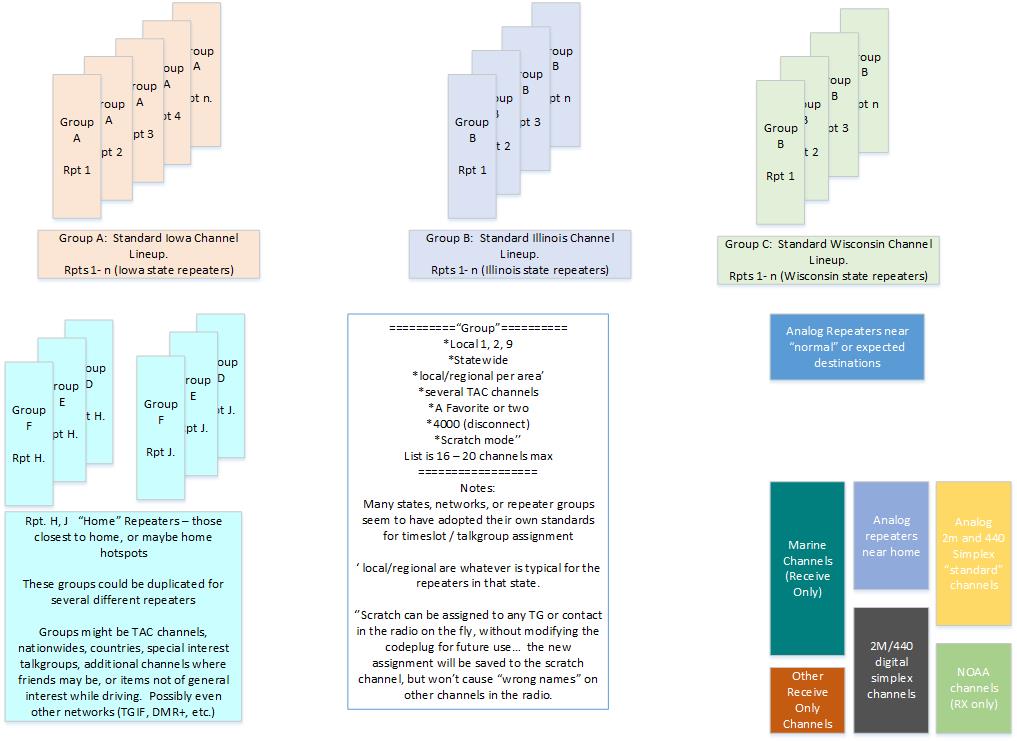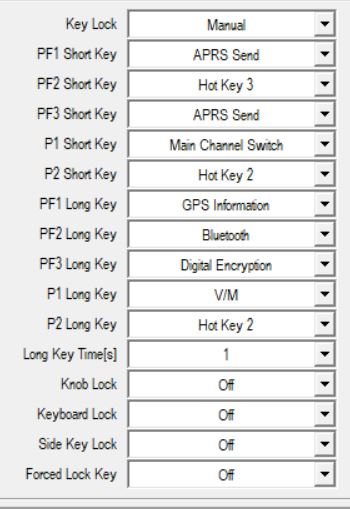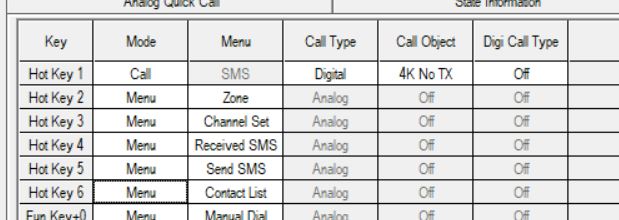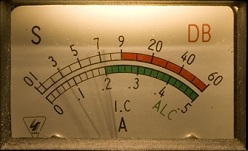So… I am by NO means an expert… but I’ve had some thoughts on DMR programming before, and I have some additional thoughts to share.
Contacts
The radio can support a boatload of contacts – and there’s a number of places to download the US-only or US database.
I load the entire US Database. It takes some time, but you don’t need to update it terribly often. Since the radio loads the contact list separate from all the channels and other settings, it means you can do programming updates a little faster. I only update the contacts list when I’m doing a BIG re-write.
Talkgroups
Well, you need to figure out which netowrks you have available… Brandmeister is the most popular… but TGIF, DMR+, and DMR-MARC all have unique talkgroup sets.
Once you figure out what network (or networks) you’re going to use, peruse the talkgroups available. I would avoid using ALL of the talkgroups, and just use a subset of the networks you plan to use (and don’t forget to somehow tag the TG name with the network in those cases, since you might have duplicate names). See my post on the MMDVM ini file notes for how this plays into your hotspot.
For brandmeister, anyway (since it seems to be available on a lot of repeaters, generally), I might have all 50 states in the radio, I do have all the local / iowa stuff, and then I’ve dropped in a few other “interesting” groups (“DMR Campfire”, P25 Bridge, 1776, and a couple others) but I don’t have ALL of the talkgroups possible in there – it makes programming a real booger when you have 2,000 talkgroups to search through for the one you want…
As I said before, at the END of my talkgroup list is a set of private call “talkgroups” to people I know well and might expect to direct call. This allows me to pull them up quickly in the scratch channel on a repeater. Just hit “List” and then the up button to go to the end of the list where you have those contacts saved.
Zones
Zones are different in the digital world, to a degree. It likely makes the most sense to make each digital repeater (and your hotspot) unique zones. The rationale is that you treat repeaters like physical ZONES – north Huntsville, south Huntsville, etc. Means that we need to know approximately where repeaters are physically. You can account for that in your zone name, too.
Many repeaters DO support roaming, so that’s an option, if you really need it – I set it up for the State of Iowa and Northern Illinois statewide systems. These aren’t systems in the same way something like STARCOM or MOSWIN is in the commercial world, but they’re individual repeaters that have banded together to use a standard talkgroup / timeslot configuration for some degree of standardization within the state.
My recommendation is to come up with ~16 – 20 talkgroups that you might use (including a “scratch” channel, and one channel set to “4000” – disconnect). Program this set for each repeater. If you want to have a bunch of other talkgroups programmed, set those for other zones (like if you want to have a zone for the different statewide talkgroups, or whatever)
The drawing below shows the basic layout I use for a codeplug. Note that a “Group” represents a group of talkgroups that is always the same (“Group A” = “Group A”, always). this means whichever of the Iowa repeaters I select, i have a consistent list of talkgroups available.

It may seem tempting to have zones in your radio for places you travel, if you go on the road for work or pleasure. This can double or triple the number of zones you would have in the radio, and add clutter that isn’t used but for once a year or so. In today’s environment of cheap hard drive space, free online storage, etc., and the fact that these files are easy to save and transfer, let’s take advantage of technology! Consider, if you’re a traveler, creating unique codeplugs for your travels. Have one for California and a different one for Maryland. You can easily reprogram the radio with the “unique” codeplug before you leave, or when you get where you’re going, and then re-load your “home” codeplug when you get home. The files are small, and it’s easy to keep a library. It seems that many clubs and regional repeater groups seem to have a “basic” codeplug for many of today’s more popular radios available for starting points…. and it’s really not too difficult to generate a codeplug when you know what physical repeaters will be in the area, as long as you’re not trying to create a codeplug with every single brandmeister talkgroup for each physical repeater you expect to encounter.
As you can see, I have the “unrecommended” setup for Illinois and Wisconsin, just because of an annual fishing trip. I’ll probably remove those zones for simplicity when I get back this year. It really is a hassle to go through all of those when I’m changing zones within my “home” area.
Key mapping
You can remap the function keys…. Take advantage of this to bring the most used functions to your front panel. Some radios (like Anytone) add “hotkeys” – which seem to be a set of configurable functions that can then be used as front panel key mapping. (Note that my limited hotkey configuration is also listed below.)


Note: Hotkey 1 doesn’t work. This is a common problem apparently – now that I look at it, probably because “Dig Call Type” is set to OFF. Might set it as a Group Call…
Tones
I did change the key-up and “end call” tones. The beeping was obnoxious and too long. I DID learn that some tones (like the astro talk permit tone) don’t work on all radios, even by a single manufacturer (e.g., it works on the portable, but not the mobile)
So What’s the Takeaway?
Well, certainly, do what works for you… but keep useability in mind. Additionally, if you’re running multiple radios (mobile and portable, for example), consider how to keep the setups consistent for yourself. Generally speaking, if you need to spend more than just a few seconds in menus to find a talkgroup or perform a function, either you don’t need to be messing with that function often, or there might be a better way to handle it.
I STILL say that your codeplug should take advantage of the radio capacity and capability, but not challenge it.
